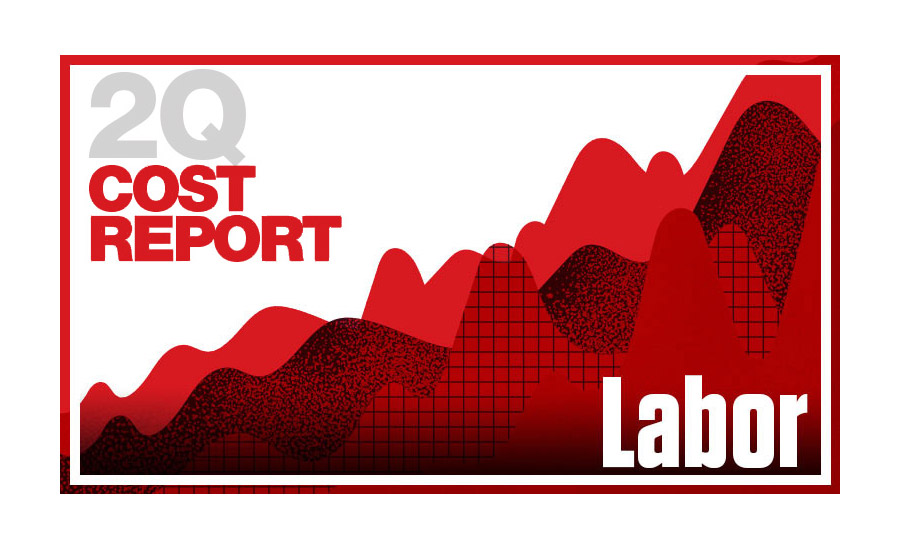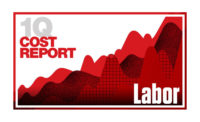2023 2Q Cost Report
Rising Increases in Compensation Are Set to Remain in 2023 and 2024

Compensation hikes for construction staff remain at a historically high pace, even as some sectors could see a future slowdown in project starts. In 2022, staff base salary increases averaged 5.13%, according to data from compensation consultant Personnel Administration Services—marking the first time since 2000 that average raises reported to the firm's survey surpassed 5%.
Although average base salaries tend to rise and fall gradually from year to year, compensation has jumped recently. In 2020, the average base salary raise for construction staff was 3.6%. The following year, it hit 4.2%. A year later, the average was up by nearly a full percentage point.
The sudden rise in compensation may have caught some employers by surprise. In its 2022 management staff salary survey, they predicted they would keep salaries level at 4.2% this year.
“Last year, when we published the survey in March, it didn’t take more than a month before we started getting anecdotal comments from clients, who said their numbers would be higher,” says Jeff Robinson, president of PAS. “Every month, it was going up about 0.2%. So, by the time we got to September, we felt like we were going to be above 5% for the year.”
Based on current data, that upward trend is set to continue in 2023, Robinson says. In its 2023 management staff salary survey, respondents predicted that annual increases would average 4.4%.
However, PAS conducted an update to its survey four months after the initial one and found that employers were already facing higher increases. Among companies that had completed their 2023 pay increases, the updated survey showed an average hike of 5.5%.
Other data also suggests that compensation may not have peaked yet. The U.S. Bureau of Labor Statistics Employment Cost Index showed the 12-month change in average wage and salary in construction was 3.6% in the first quarter of 2022. By the end of the year, it was up to 4.8%. In the first quarter of 2023, it hit an eye-popping 5.7%. Robinson says this is notable because average increases PAS reports tend to run higher than the government statistics.
“I don’t know that we will be above 5.7% this year, but I feel comfortable saying 5.3%,” he adds. “At this point, I think 5.5% would be a stretch.”
Employers are also anticipating another year of big salary increases in 2024. As part of its update, PAS asked employers to provide their “best guess” for pay hikes next year. Respondents reported an average of 4.25%.
“If it continues just the way it has for the past two years, that 4.25% is going to escalate,” Robinson points out.
“It’s rare to find a pool of candidates who spent 15 years at [the same] company.”
Dan Pauletich, Senior Managing Director, Specialty Consultants
Escalating pay increases come at a time of higher-than-normal staff turnover. PAS data shows that turnover rates increased from an historical average of around 14% to more than 17% in 2021 and 2022.
Bob Honour, president of recruiting firm H&H Consultants, says compensation is rising as employers are increasingly desperate to hold on to their talent. “[Employers] are doing everything they can,” he says. “In the past, I’ve seen maybe one in 20 job candidates get a counteroffer from their [current] company. Now, it’s more like 15 out of 20.”
In today’s market, job candidates generally expect a 10% to 15% salary increase to move to a new company, according to Honour. Candidates for preconstruction positions, particularly estimators, are the hardest to find, he notes.
At a time of higher turnover rates, Honour says he sees more candidates willing to leave their current companies after a short period of employment. “I see a lot less loyalty,” he says. “I’ve got millennials, who have been someplace for eight months and are ready to move.”
Dan Pauletich, senior managing director at search firm Specialty Consultants, sees a similar trend. “It’s rare to find a pool of candidates who spent 15 years at [the same] company,” he says. “Tenure has really shortened up to three to five years. My sense is that a large portion of the workforce has never experienced a recession. So, their reality is that there’s always another opportunity available. It’s much more short-term thinking.”



